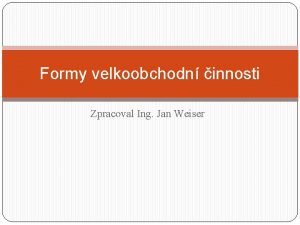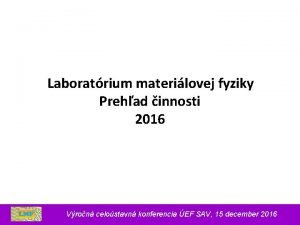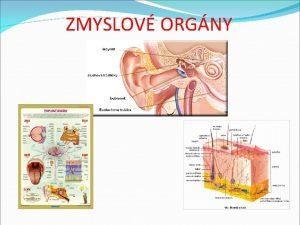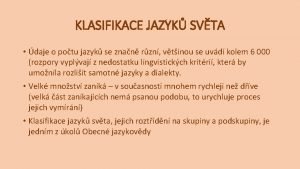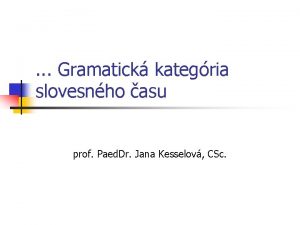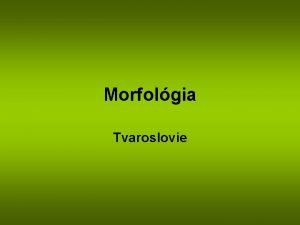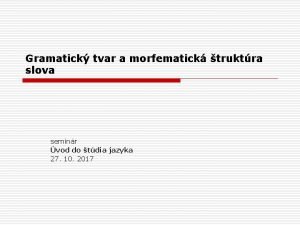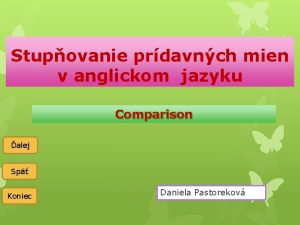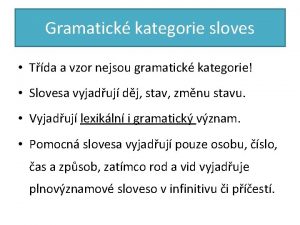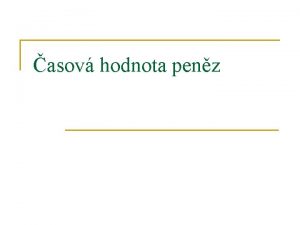Prehad asov v anglickom jazyku gramatick prruka pre








- Slides: 8

Prehľad časov v anglickom jazyku gramatická príručka pre študentov religionistiky FF PU Vypracoval: Tomáš Buchala 14. 04. 2008 1

Present simple and continuous Present simple is used to express a habit I get up at six. a fact which is always true Vegetarians don´t eat meat. Water freezes at 0 C. a fact which is true for long time I live in LM and she works in a bank. often used with adverbs of frequency: always, often, sometimes, hardly ever, never, every Sunday, once a month, three times a year, once in a blue moon, etc. Present continuous We use for activities happening at the time of speaking or around the time of speaking I am having breakfast now. She is reading a book by Steinback. a planned future arrangement: I´m meeting him at five. What are you doing this evening? He is not traveling today. changig/developing situation Our English is getting better and better. 2

Present perfect simple expresses what has happened before now, action happened at not definite time in the past I have met a lot of famous people. action can continue to the present and probabbly to the future: She has lived here for 20 years. an experience of sb. ´s life Have you ever been to the U. S? She has never been to the U. S. expressions used with present perfect: since, for, ever, never, always, recently, just, yet, already, this year, today, etc I have lived there since I finished school. Has the postman been yet? I have already had breakfast this mornig. continuous activity which began in the past and continues to the present We have been waiting for hours. It has been raining for all week. activity with result now She doesn´t have any money, she has been shopping. frequently used with: How long, for, since Note that you can say: How long have you worked here? How long have you been working here? 3

Past simple and past continuous past simple past continuous we use past simple for activities that finished at certain time in the past in general I did it yesterday. We did not play tennis last Sunday. What did you do yesterday? a senquence of finished events in chronological order I took out the key, opened the door and walked in. actions as simple facts I did not watch TV last night. expressions used with simple past: last year, last month, ago, yesterday, in 1996, on Monday, when, etc we use for activities that took some time in the past I was doing it yesterday at 10 o´clock. You were making a lot of noise last night. to talk about temporary situations or actions in progress He was living in South Africa at the time. expressions used with continuous: while, as, at, when I woke up when the sun was shining. What were you doing at 10 yesterday? I was doing my homework while she was cooking. 4

Past perfect simple continuous an action in the past which happened before another action in the past When I got home, John had cooked a meal. /John cooked a meal before I got home/ expressions: before, because, when What did you do after you had finished? sentences are perhaps not in chronological order: I was tired, because I had been working hard last week. /1 -work. 2 -tired/ She did not pass the exam, although she had been studying for three days. 5

Future will a future decision or spontanious reaction made at the moment of speaking -Which one do you want? -I will take the red one, thanks. future prediction and promise I will travel round the world when I retire. to express an offer, request, threats Will you help me? Will you do sth. for me? I wiil meet you at the station. going to used for future intentions, made before the time of speaking I am going to Greece for holiday. some time in future/prediction based on a firm evidence: The vase is going to fall. It is certainly not going to snow all week. perfect future action which will be finished BY or before a certain time in future I will have saved a million by the year 2020. This time next week she will have finished her exams. Present continuous a planned future arrangement I´m staying in the hotel for a day. What are you doing this evening? 6

Compare simple is used when the action is complete and the final result is important I have run six kilometres. I have written three letters this morning. state verbs do not express action /never use –ing/ love, hate, like, prefer, want, need, believe, understand, know, forget, mean, demand, remember, agree recommend, consist, contain, depend. see, hear, smell, taste have for possession, think for opinion continuous Continuous is used when the activity /not the result/ is important. We are interested how someone has spent time: I am hot, because I have been running. She has been writing letters all day. Examples This parfume smells too strong. I have known Alice for 14 years. Not: I have been knowing… I think it´s a good idea. But: I have been thinking about that for some time. 7

Check your grammar! Exercise: Write true sentences about you An activity true around now An activity with the result now An activity from a day before yesterday A future intention A future arrangement An action finished by 2020 A habit of yours A “state verb” sentence See for more: R. Murphy, Grammar in use Intermediate, OUP 2005 8
